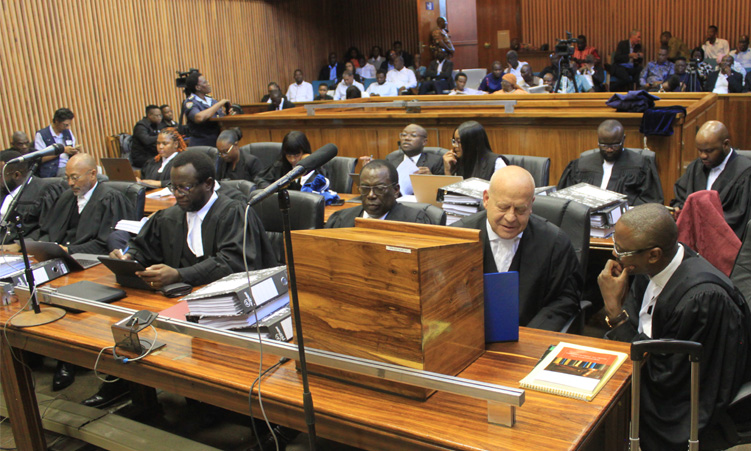THE Ombudsman’s probe into racism may open up a hornet’s nest in certain respects, but perhaps it’s a good thing that will give this vexatious issue some light and air.
The somewhat simplistic understanding of the concept of racism comes, of course, from our apartheid past of institutionalised discrimination of white against black. But nearly two decades after Independence, things have changed and racism now has a very different face.THIS may or may not come out at the Ombudsman’s hearing currently underway in the capital, and in other centres of the country in the next weeks, but suffice it to say that racism is alive and well in Namibia, in many different guises and disguises.Under the weighty title of ‘Public Hearings on Racism/Racial Discrimination: Perception or Reality in Namibia?’ the Ombudsman launched the probe in spite of the fact that this office reportedly received only five complaints about racism over the past 10 years.But the very concept of ‘racism’ is complex.For there to be ‘racism’ say some, the colour issue has to come into the equation, otherwise offences in this regard qualify instead as ‘tribalism’.The UN Convention on the Elimination of All Forms of Racial Discrimination, however, makes scant distinction between the terms ‘racial’ and ‘ethnic’ discrimination.it says: “the term ‘racial discrimination’ shall mean any distinction, exclusion, restriction or preference based on race, colour, religion, descent, or national or ethnic origin which has the purpose or effect of nullifying or impairing the recognition, enjoyment or exercise, on an equal footing, of human rights and fundamental freedoms in the political, economic, social, cultural or any other field of public life”.It’s a wide-open debate, but for my purposes I prefer the broader definition as outlined in the UN Convention, or one risks getting bogged down in the complexities of definitions, rather than dealing with the scourge itself, however it may manifest.I’d prefer also not to acknowledge a term known as ‘reverse-racism’, because this in itself implies that ‘racism’ in its pure form, is white against black, and ignores all the gradations in between.The Office of the Ombudsman was quick to point out that the purpose of the hearings is not to investigate specific incidents, but rather to determine the scale on which racism or discrimination is practised in this country.Living in the pluralistic society that we do, we can accept that we have fairly high levels of racist sentiment, but I’m not sure that the Ombudsman is going to be able to prove the extent to which this is the case.In fact it may prove to be an exercise in futility unless we know where this investigation is going to lead us, and what we plan to do about the outcome.And whether, in light of the findings, we are going to contemplate change to our Anti Discrimination Act and/or more particularly our affirmative action policies, which are also perceived in some quarters to be inherently ‘racist’.We’ve seen racism at work as it was in the apartheid days, and there’s none who could argue the case for institutionalised discrimination on the scale it was practised back then.But we could well be seeing it at work again today in a different guise, now that the tables have been turned.Is the ‘white’ school-leaver with good qualifications and track record on the receiving end of racism when he/she is denied employment on grounds of skin colour? Are our brown-skinned compatriots being treated in a racist manner when they are told they are ‘not black enough’ to be termed ‘previously disadvantaged’? Is a black Namibian who is turned down for a post or bursary because of tribal origin being discriminated against? I’d answer in the affirmative to all of the above.And while it would again be idealistic and also naive to argue that people should all be treated equally and judged on merit only in any of the above situations, it is probably the situation we should strive for in the long run.But we’re not there yet, especially while we are trying to address the imbalances of the past.And it seems that we cannot do this without discriminating, either positively or negatively.So possibly the focus should lie not on whether discrimination/racism still exists in Namibia.It does.We can do little about individual prejudice, except through instilling tolerance through education.We can however, take remedial action against more formal racism or discrimination, but we need to subvert our colours and cultures to a large extent in order to do so.And that won’t be a popular idea to a lot of folk.So the point is, are all of us ‘Namibian’ enough to give what it will take to eliminate racism from our midst?But nearly two decades after Independence, things have changed and racism now has a very different face.THIS may or may not come out at the Ombudsman’s hearing currently underway in the capital, and in other centres of the country in the next weeks, but suffice it to say that racism is alive and well in Namibia, in many different guises and disguises.Under the weighty title of ‘Public Hearings on Racism/Racial Discrimination: Perception or Reality in Namibia?’ the Ombudsman launched the probe in spite of the fact that this office reportedly received only five complaints about racism over the past 10 years.But the very concept of ‘racism’ is complex.For there to be ‘racism’ say some, the colour issue has to come into the equation, otherwise offences in this regard qualify instead as ‘tribalism’.The UN Convention on the Elimination of All Forms of Racial Discrimination, however, makes scant distinction between the terms ‘racial’ and ‘ethnic’ discrimination.it says: “the term ‘racial discrimination’ shall mean any distinction, exclusion, restriction or preference based on race, colour, religion, descent, or national or ethnic origin which has the purpose or effect of nullifying or impairing the recognition, enjoyment or exercise, on an equal footing, of human rights and fundamental freedoms in the political, economic, social, cultural or any other field of public life”.It’s a wide-open debate, but for my purposes I prefer the broader definition as outlined in the UN Convention, or one risks getting bogged down in the complexities of definitions, rather than dealing with the scourge itself, however it may manifest.I’d prefer also not to acknowledge a term known as ‘reverse-racism’, because this in itself implies that ‘racism’ in its pure form, is white against black, and ignores all the gradations in between.The Office of the Ombudsman was quick to point out that the purpose of the hearings is not to investigate specific incidents, but rather to determine the scale on which racism or discrimination is practised in this country.Living in the pluralistic society that we do, we can accept that we have fairly high levels of racist sentiment, but I’m not sure that the Ombudsman is going to be able to prove the extent to which this is the case.In fact it may prove to be an exercise in futility unless we know where this investigation is going to lead us, and what we plan to do about the outcome.And whether, in light of the findings, we are going to contemplate change to our Anti Discrimination Act and/or more particularly our affirmative action policies, which are also perceived in some quarters to be inherently ‘racist’.We’ve seen racism at work as it was in the apartheid days, and there’s none who could argue the case for institutionalised discrimination on the scale it was practised back then.But we could well be seeing it at work again today in a different guise, now that the tables have been turned.Is the ‘white’ school-leaver with good qualifications and track record on the receiving end of racism when he/she is denied employment on grounds of skin colour? Are our brown-skinned compatriots being treated in a racist manner when they are told they are ‘not black enough’ to be termed ‘previously disadvantaged’? Is a black Namibian who is turned down for a post or bursary because of tribal origin being discriminated against? I’d answer in the affirmative to all of the above.And while it would again be idealistic and also naive to argue that people should all be treated equally and judged on merit only in any of the above situations, it is probably the situation we should strive for in the long run.But we’re not there yet, especially while we are trying to address the imbalances of the past.And it seems that we cannot do this without discriminating, either positively or negatively.So possibly the focus should lie not on whether discrimination/racism still exists in Namibia.It does.We can do little about individual prejudice, except through instilling tolerance through education.We can however, take remedial action against more formal racism or discrimination, but we need to subvert our colours and cultures to a large extent in order to do so.And that won’t be a popular idea to a lot of folk.So the point is, are all of us ‘Namibian’ enough to give what it will take to eliminate racism from our midst?
Stay informed with The Namibian – your source for credible journalism. Get in-depth reporting and opinions for
only N$85 a month. Invest in journalism, invest in democracy –
Subscribe Now!









